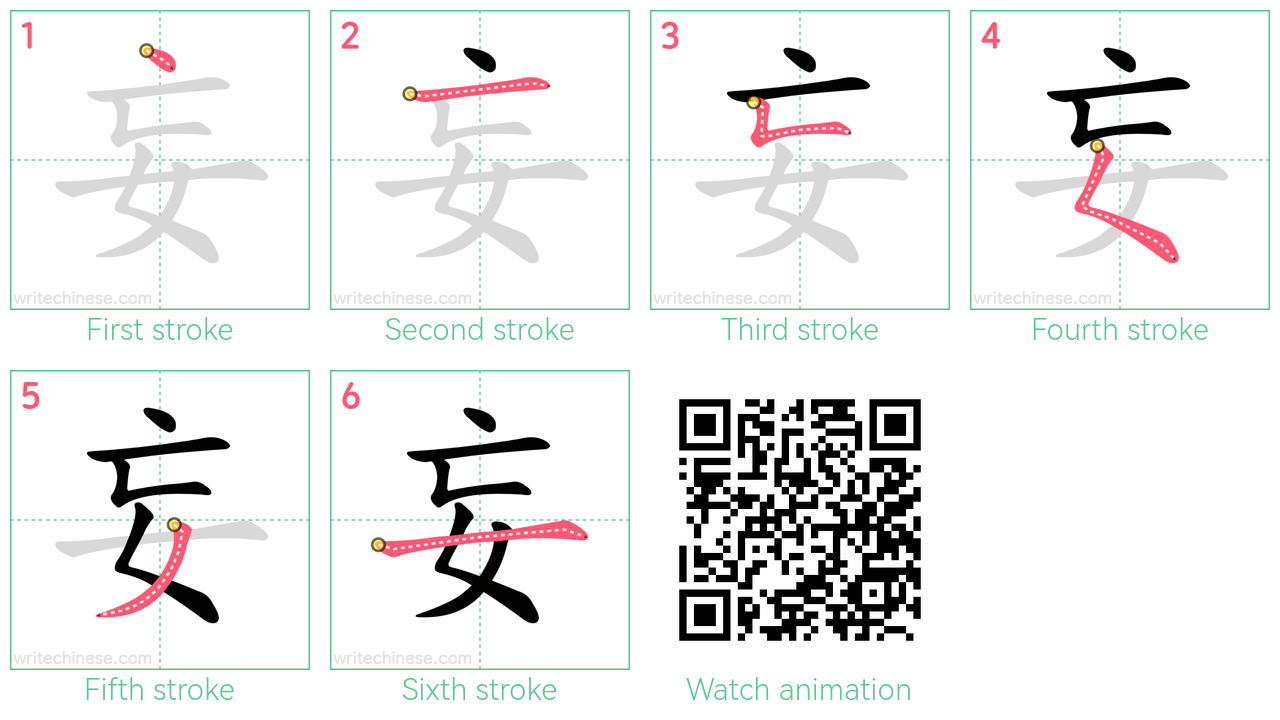How to write 妄
Animated Stroke Order of 妄
Learn to write the Chinese character "妄 " by watching the stroke order animation of "妄 ".
Stroke by Stroke: 妄 Writing Order
Master the Chinese character '妄 ' stroke by stroke with visual step-by-step instructions.
Follow the Calligraphy Master: Writing '妄 ' Step-by-Step
Learn the proper way to write the Chinese character '妄 ' through a video tutorial with a
calligraphy teacher. Follow the Calligraphy Master's Step-by-Step Guide to Write the
Chinese Character '妄 '. You can download the printable handwriting worksheets below and
practice writing together with pen and paper.
Free Printable 妄 Handwriting Practice Worksheets
Printable Writing Practice Worksheet of "妄 "
Printable Stroke Order Practice Worksheet of "妄 "
Meaning of 妄
Pinyin
wàng
Definition
absurd / fantastic
妄 [wàng]
1. At random; absurd and unreasonable.
- Example: 轻举妄动 (act rashly).
- Example: 胆大妄为 (act recklessly).
- Example: 妄自尊大 (arrogantly overestimate oneself).
- Example: 妄图 (foolishly attempt).
- Example: 狂妄 (delirious, outrageous).
- Example: 妄想 (fantasize).
2. Improper; unrealistic.
- Example: 姑妄听之 (just listen to it whimsically).
- Example: 妄自菲薄 (unduly belittle oneself).
- Example: 妄作主张 (foolishly make a claim).
妄 [wàng]
Adverb
- Original Meaning: At random.
- Character Formation: Phono-semantic compound; comprises 女 (female) and 亡 (to lose).
1. Same as the original meaning (at random).
妄 [wàng]
Adjective
1. Unreal; highly unrealistic.
2. Illegal; act recklessly.
3. Rash; unrestrained.
4. Absurd; preposterous.
5. Equivalent to “凡”; mediocre.
引 (Cited References)
1. 《说文》: 妄,乱也 (means chaos).
2. 《管子·山至数》: 不通于轻重谓之妄言 (saying something absurd without understanding the importance).
3. 《贾子道术》: 以人自观谓之度,反度为妄 (to judge oneself is called measuring; the opposite is absurd).
4. 《春秋繁露》: 施妄者,乱之始也 (those who act absurdly bring about chaos).
5. 诸葛亮《出师表》: 妄自菲薄 (unduly belittle oneself).
6. 宋·司马光《训俭示康》: 多求妄用 (excessive requests lead to recklessness).
7. 清·黄宗羲《原君》: 妄传伯夷 (foolish rumors about Bo Yi).
8. 清·徐珂《清稗类钞·战事类》: 毋妄发 (do not act recklessly).
例 (Examples)
如: 妄口 (talk nonsense); 妄系 (wrongfully accuse); 妄扳平人 (unjustly drag innocent people in); 妄施 (give generously without restraint); 妄折 (bend to pressure indiscriminately); 妄行 (act carelessly); 妄言 (speak recklessly).
妄 [wàng]
Adjective
1. Unreal; highly unrealistic.
引 (Cited References)
1. 《广韵》: 妄,虚妄 (means unreal).
2. 《论衡·问孔》: 此言妄也 (this comment is false).
3. 《大戴礼记·文王官人》: 故得妄誉 (thus receives false praise).
4. 汉·王充《论衡·订鬼篇》: 妄见之也 (falsely observed).
例 (Examples)
如: 妄誉 (false praise); 妄诞 (unreal); 妄执 (foolish obsession).
2. Illegal; act recklessly.
引 (Cited References)
1. 《左传·哀公二十五年》: 彼好专利而妄 (he likes to monopolize and act unlawfully).
2. 《梼杌闲评——明珠缘》: 若再妄求,恐非后福 (if you seek recklessly again, beware of misfortune).
例 (Examples)
如: 妄诛 (punishment without reason; indiscriminate killing); 妄杀 (random murder); 妄作 (do something recklessly); 妄进 (improper advancement).
3. Rash; unrestrained.
引 (Cited References)
1. 清·纪昀《阅微草堂笔记》: 性悖妄 (character stubborn and reckless).
例 (Examples)
如: 妄男子 (a rash and ignorant man).
4. Absurd; preposterous.
引 (Cited References)
1. 《韩非子·外储说左上》: 王因囚而问之,果妄,乃杀之 (the king imprisoned him and found him absurd, so he executed him).
2. 清·刘开《问说》: 妄以臆度 (to judge absurdly based on conjecture).
例 (Examples)
如: 妄语 (absurd or illogical statements); 妄异 (absurd and strange); 妄妖 (absurd and evil).
5. Equivalent to “凡”; mediocre.
引 (Cited References)
1. 《史记·齐悼惠王世家》: 人谓魏勃勇,妄庸人耳,何能为乎! (people say Wei Bo is brave, but he is just a mediocre man, what can he achieve!).
例 (Examples)
如: 妄庸 (mediocre); 妄匠 (mediocre craftsman); 妄尉 (mediocre low-ranking officer).
to try in vain / futile attempt
egotistical / arrogant / brassy
to attempt vainly / a vain attempt / delusion
to rush indiscriminately into action
to act blindly without thinking (idiom)
daring / presumptuous / daredevil
to be carried away by one's wishful thinking (idiom) / to labor under a delusion / wishful thinking
lies / wild talk / to tell lies / to talk nonsense / fantasy (literature)
ridiculous self-importance (idiom); arrogance
to tell lies / to talk nonsense
to be unduly humble (idiom) / to undervalue oneself
to make a false and unwarranted declaration
an accident / an undeserved catastrophe / unexpected calamities
wild fantasy / unwarranted thought
see 恣意妄為|恣意妄为[zi4 yi4 wang4 wei2]
Same Pronunciation Characters
Same Radical Characters




